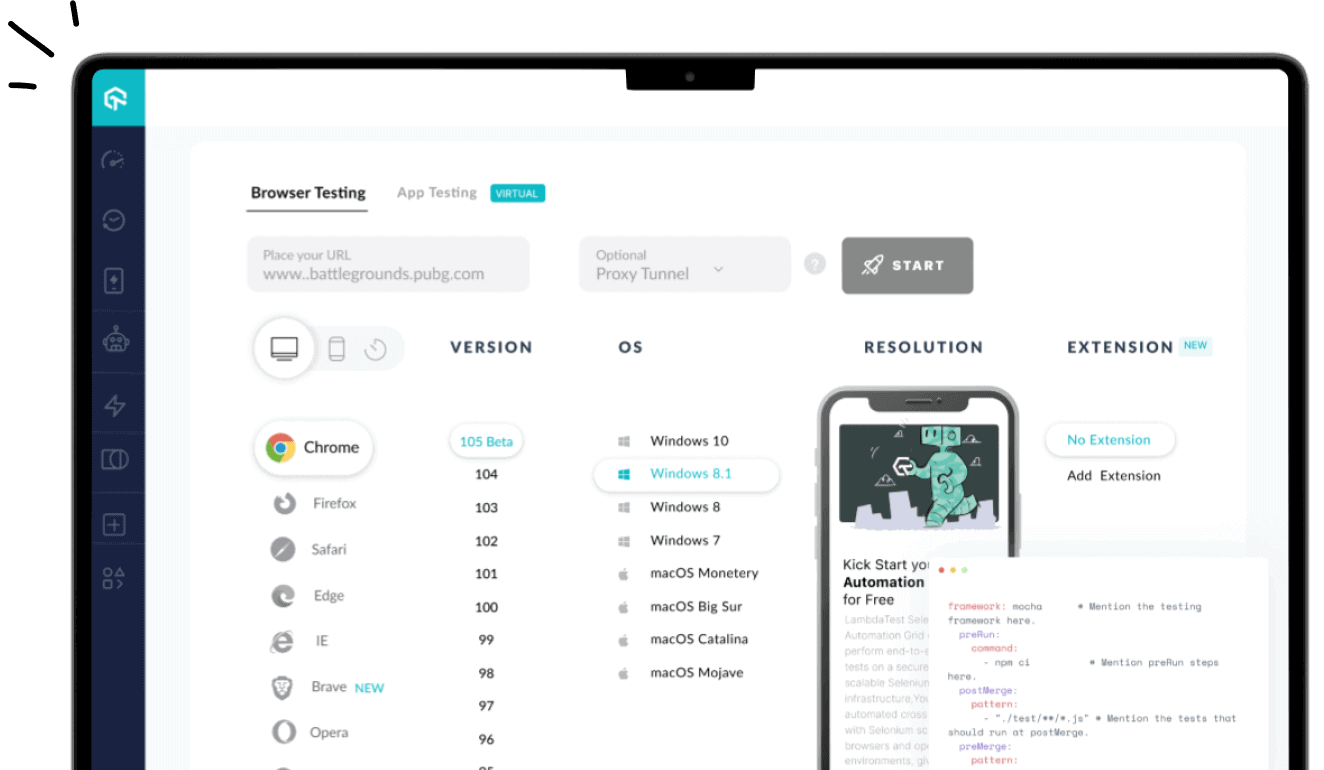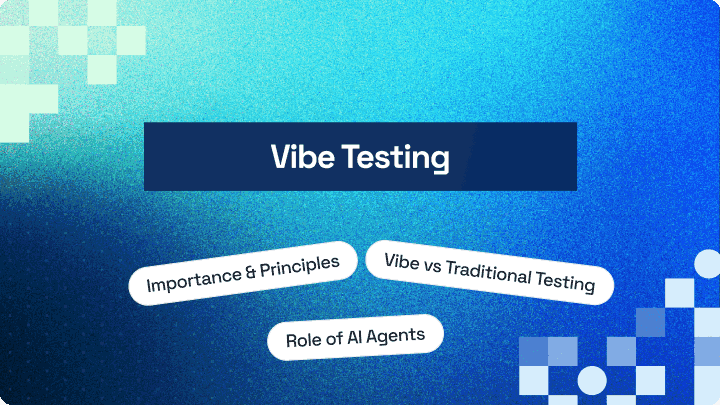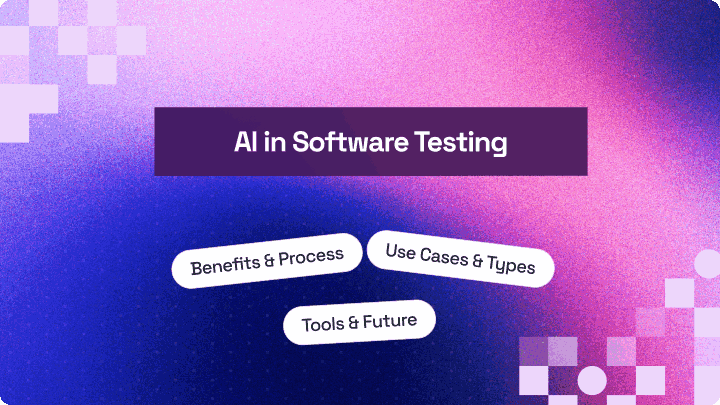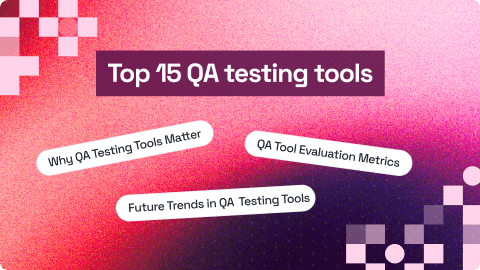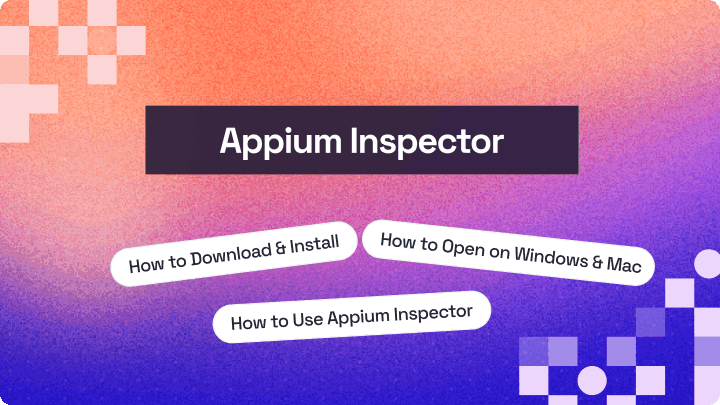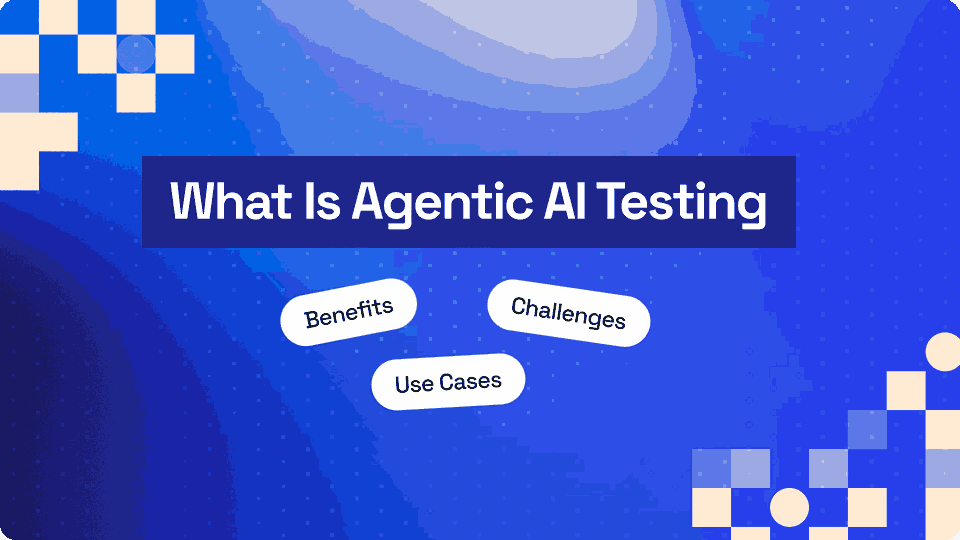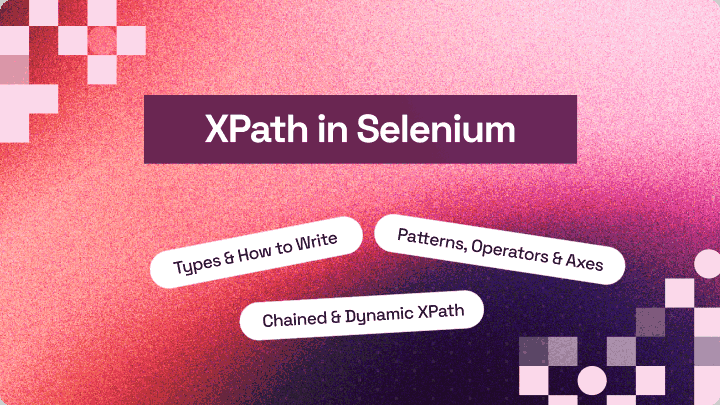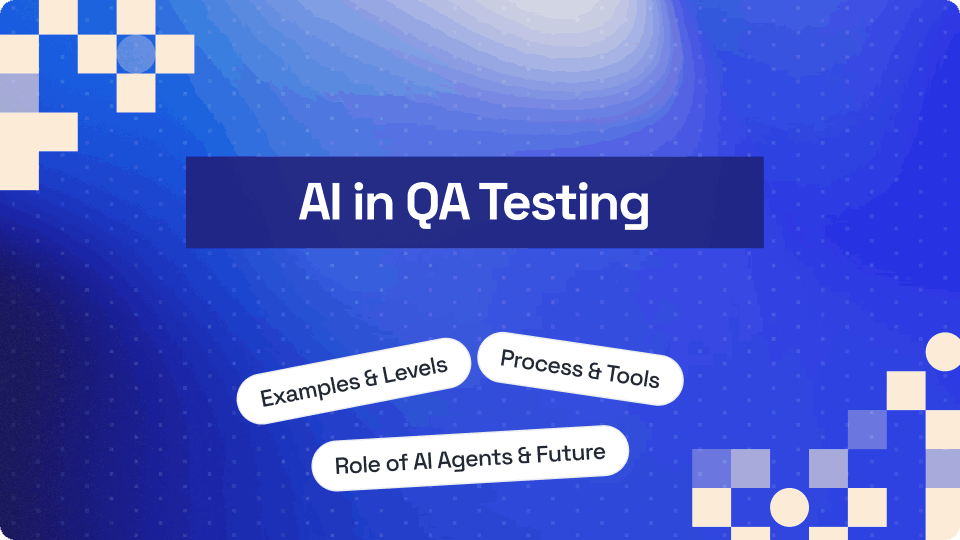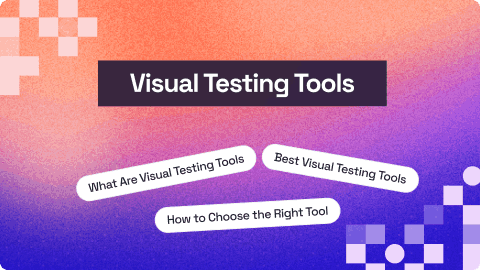Top 15 Open-Source AI Testing Tools You Need in 2025
Saniya Gazala
Posted On: August 11, 2025
20 Min
Chapters
- AI Testing
- Generate Test Cases With AI
- Generate Tests With AI
- AI Testing Tools
- Open-Source AI Testing Tools
- AI in Test Automation
- NLP Testing
- Best AI/ChatGPT Prompts for Software Testing
- AI in Mobile Testing
- AI in Regression Testing
- AI in Performance Testing
- AI Agents
- Best AI Agents
- Agentic AI Testing
- AI in DevOps
- AI DevOps Tools
- AI and Accessibility
- AI in Software Testing Podcasts
Open-source AI testing tools offer flexibility, transparency, and adaptability for diverse engineering needs, helping teams customize frameworks, accelerate innovation, and maintain high quality without commercial lock-in.
Overview
Open-source AI testing tools promote transparency by exposing testing processes and enabling rapid experimentation without vendor restrictions.
Some of the Open-Source AI testing tools
- CodeXGLUE: AI open-source benchmark for code understanding and generation.
- AutoMLTestGen: AI open-source tool for automated test case generation.
- AI Testing Agent: AI open-source agent to analyze and validate software behavior.
- Stoat: AI open-source Android app tester using stochastic modeling.
- ReTest: AI open-source UI regression testing with smart maintenance.
- PITest: AI open-source mutation testing for Java test quality.
- EvoMaster: AI open-source generator for REST API and microservice tests.
- Schemathesis: AI open-source API testing with OpenAPI/GraphQL support.
- DeepAPI: AI open-source framework for intelligent API testing.
- RPA Framework: AI open-source toolkit for robotic process automation testing.
- Botium Core: AI open-source chatbot and conversational AI testing.
- SikuliX: AI open-source GUI testing using image recognition.
- Atheris: AI open-source coverage-guided fuzzer for Python.
- DeepExploit: AI open-source framework for automated penetration testing.
- DeepPerf: AI open-source tool for ML-driven performance testing.
Some of the Commercial AI Testing Tools
- LambdaTest KaneAI: GenAI-native testing agent for creating and evolving tests in natural language.
- Diffy: AI visual regression tool for UI changes.
- Katalon Studio: AI test automation for web, API, and mobile.
- Diffblue Cover: AI-generated unit tests for Java.
Choosing the Right Open-source AI Testing Tools
Prioritize tools with transparent roadmaps and licenses that align with your organization’s legal and operational needs.
Table of Contents
- The Role of Open-Source AI Testing Tools in Modern QA?
- Fully Open-Source AI-Powered Testing Tools
- CodeXGLUE
- AutoMLTestGen
- AI Testing Agent
- Stoat
- ReTest
- PITest
- EvoMaster
- Schemathesis
- DeepAPI
- RPA Framework
- Botium Core
- SikuliX
- Atheris
- DeepExploit
- DeepPerf
- Commercial AI Testing Tools
- Choosing the Right Open-source AI Testing Tools
- Frequently Asked Questions (FAQs)
The Role of Open-Source AI Testing Tools in Modern QA?
The approach of the Quality Assurance team has transformed with the advancement of AI. The demand for advanced testing methodologies grew as AI systems became integral to industries like autonomous technology, retail, finance, and healthcare.
Open-source AI testing tools have become essential in modern QA, offering innovative solutions to the challenges these AI systems pose. They improve testing efficiency and support scalability, reliability, and compliance for organizations handling AI-powered applications.
- Cost reduction: Provide a cost-effective alternative to proprietary solutions by eliminating licensing fees while offering sophisticated testing capabilities.
- Increased accessibility: Allow easy customization without extra costs, making advanced QA accessible to more users and driving industry innovation.
- Support for ethical AI deployment: Test for transparency, fairness, bias, and compliance, reducing legal and reputational risks.
- Innovation and collaboration: Foster community collaboration with AI experts, testers, and developers through platforms like GitHub, accelerating advanced testing and development.
- High flexibility and scalability: Offer flexible, modular architectures supporting cross-platform testing and easy integration into pipelines.
- Reliability and accuracy: Validate ML models, simulate real-world scenarios, identify edge cases, and stress-test AI models to mitigate risks.
List of Fully Open-Source AI-Powered Testing Tools
AI testing tools can be categorized based on their licensing nature: fully open-source, and commercial AI testing tools.
Below is a curated list of powerful open-source AI-powered testing tools you can fully leverage to simplify and enhance your testing process.
1. CodeXGLUE
CodeXGLUE (Code Execution and Language Understanding Evaluation) is an open-source AI testing tool and benchmark suite designed to evaluate the performance of AI models on a variety of code-related tasks.
It includes over 14 datasets covering scenarios like code-code, code-text, and text-code transformations. Baseline models such as CodeBERT, CodeGPT, and Encoder-Decoder architectures are provided to help researchers get started.
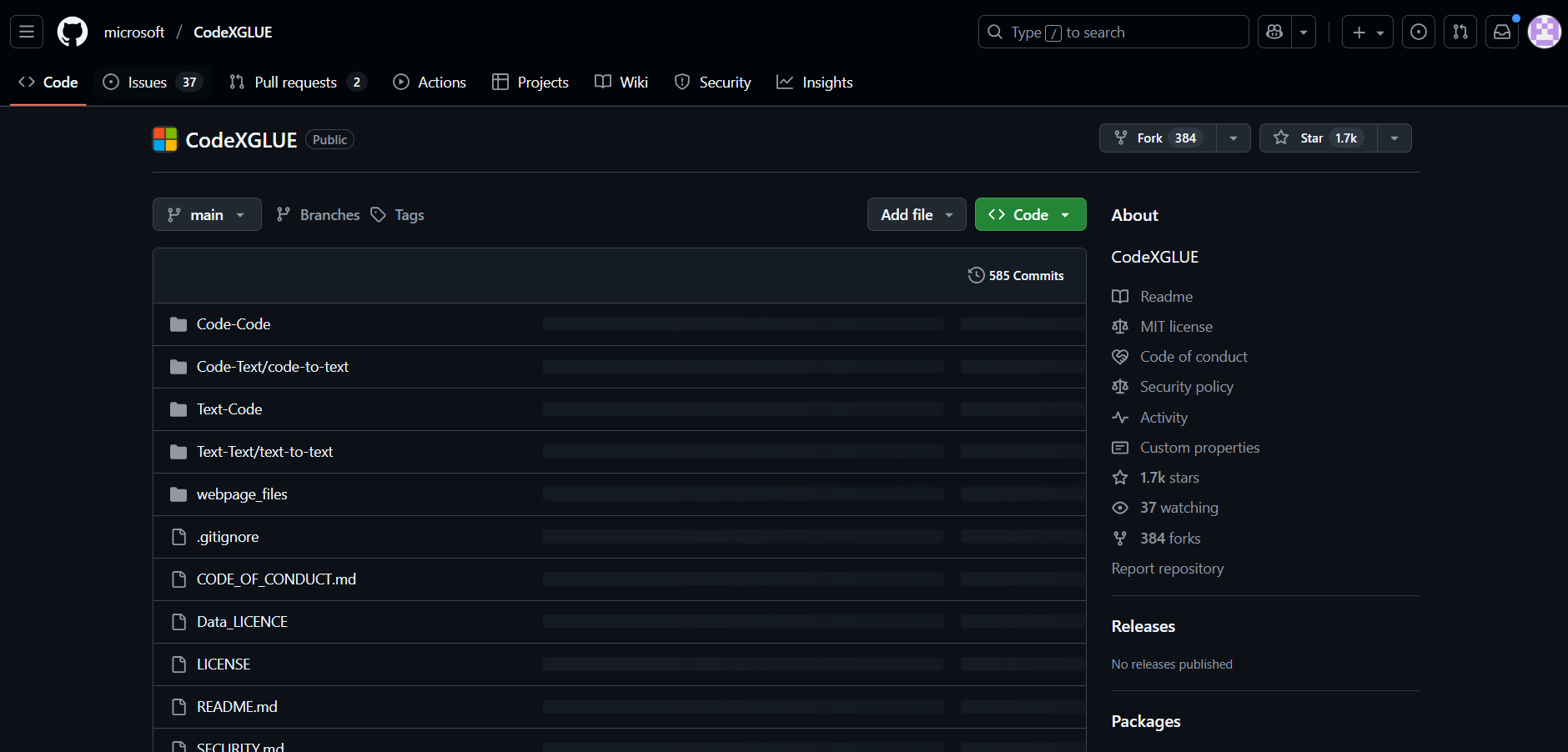
Key features:
- Model Submission: Allows developers and researchers to submit models for public evaluation via a leaderboard.
- Standardized Benchmarks: Supports tasks like code search, completion, and translation for smarter software tools.
- Challenge Coverage: Includes text-to-code generation, documentation translation, code summarization, clone detection, and defect identification.
2. AutoMLTestGen
AutoTestGen is an open-source tool designed to automatically generate and improve Java unit tests using Large Language Models (LLMs). It functions as a Visual Studio Code extension, aiming to enhance developer productivity by automating the creation of unit tests.
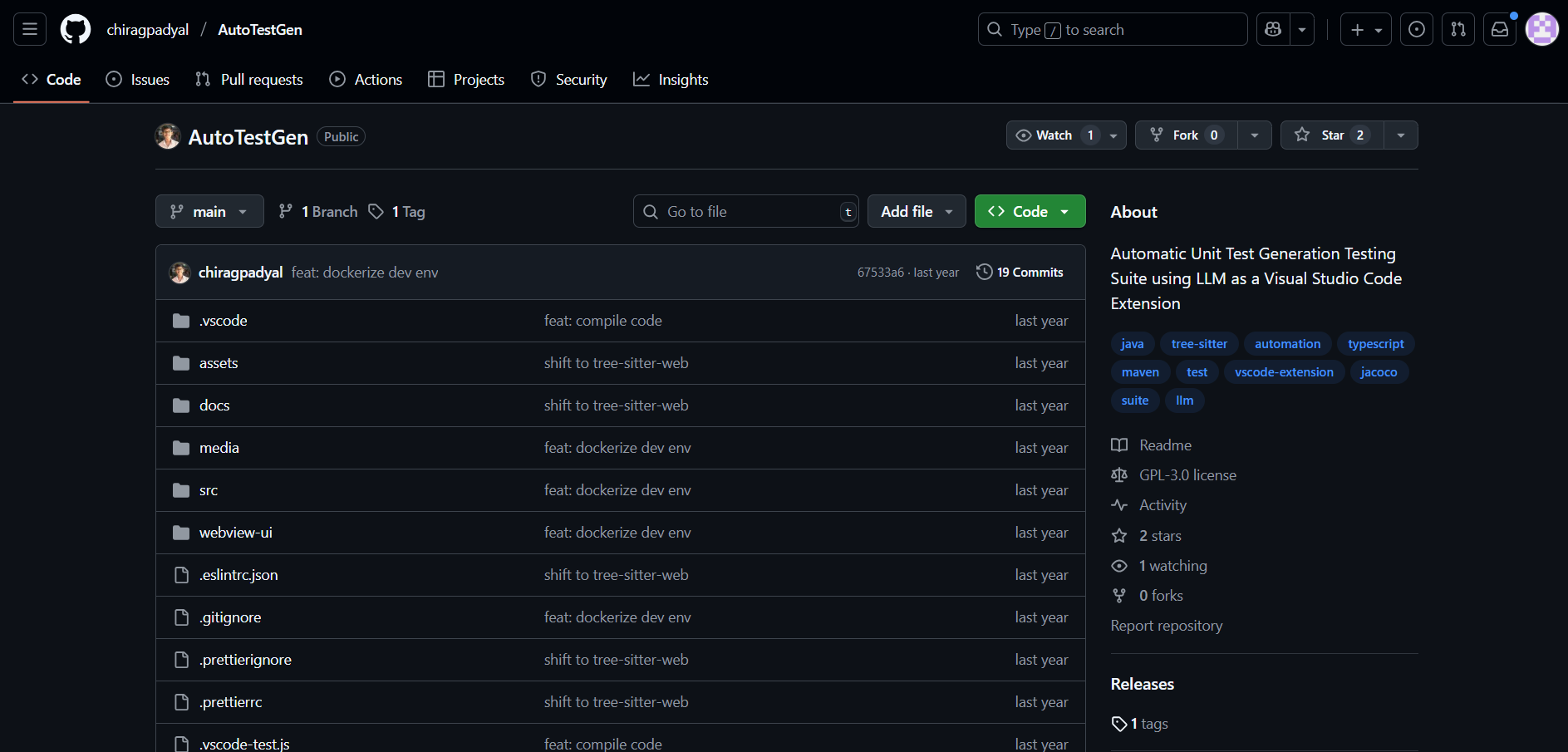
Key features:
- Unit Test Generation: Utilizes LLMs to create unit tests for Java code.
- VS Code Extension: Operates within Visual Studio Code for seamless workflow integration.
- Open Source License: Licensed under MIT, promoting community contributions and transparency.
3. AI Testing Agent
AI Testing Agent is an open-source AI agent designed for software testing. It interacts with Large Language Models to automatically generate test plans and Python test code for APIs, execute the tests, and refine them based on user feedback.
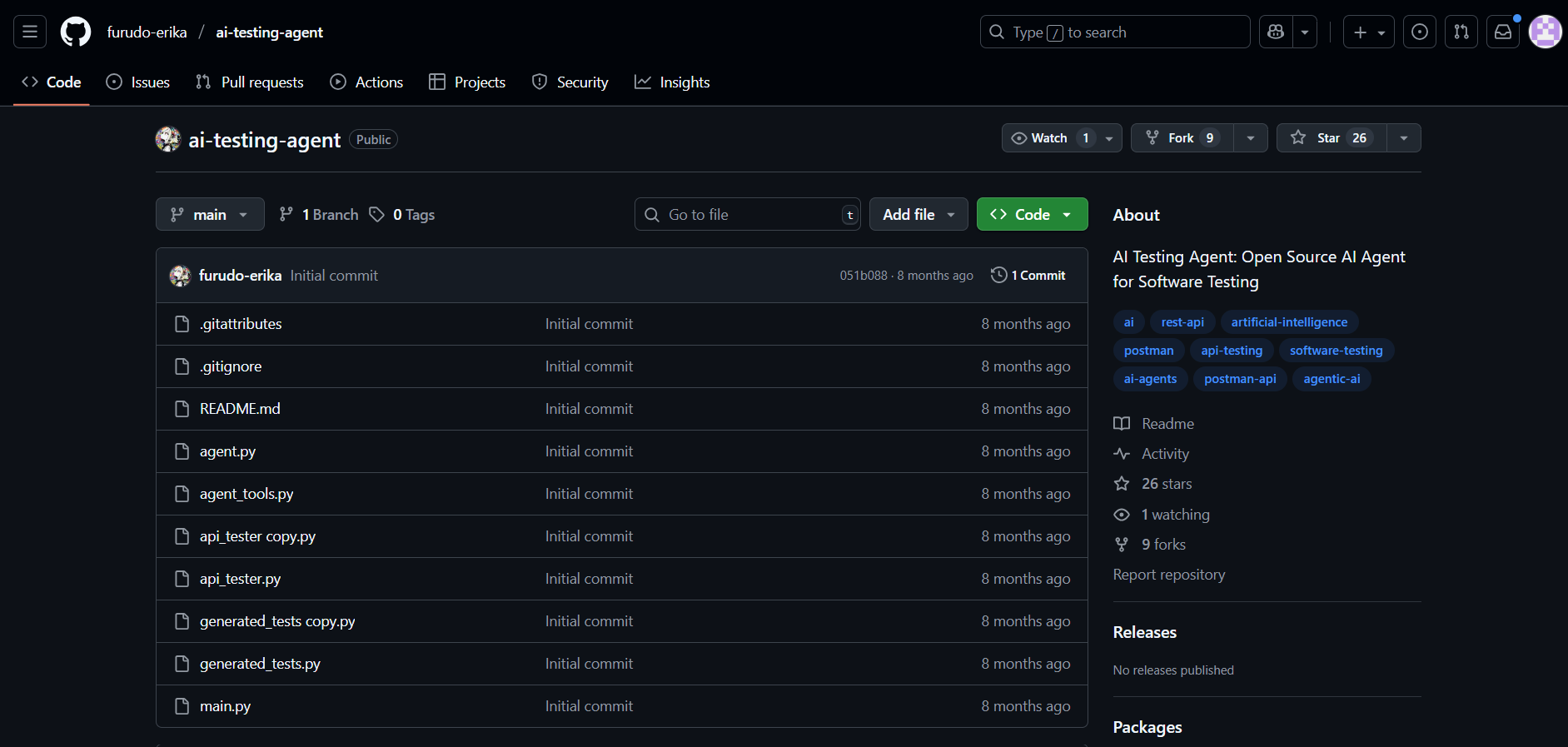
Key features:
- Test Plan Creation: Generates comprehensive API test plans using AI.
- Script Generation: Creates Python pytest scripts based on test plans.
- Test Execution: Runs generated tests and reports results.
- Iterative Feedback: Allows user feedback to refine test suites.
- Customization Support: Enables tailored testing of API endpoints and prompts.
4. Stoat
Stoat (STochastic model App Tester) is an open-source AI testing tool for Android apps that integrates evolutionary strategies and machine learning to generate effective and diverse test cases. It uses statistical models to improve coverage and bug discovery.
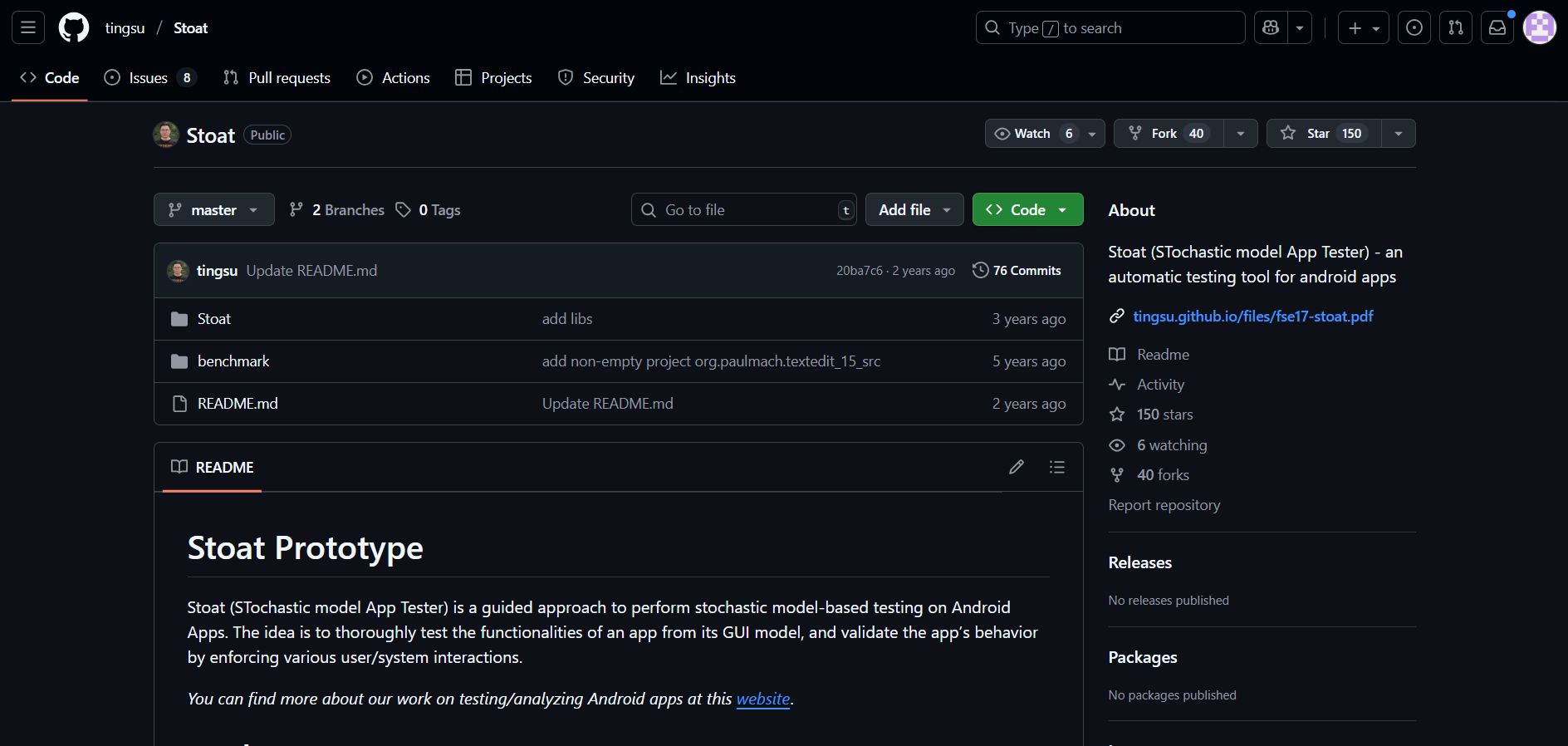
Key features:
- GUI Modeling: Builds GUI models dynamically during app execution.
- Event Generation: Uses probabilistic models to create diverse event sequences.
- Crash Detection: Identifies and logs crashes and ANRs.
- Android Support: Supports Android apps via instrumentation.
- Open Source: Available on GitHub with research support.
5. ReTest
ReTest is an open-source AI testing tool for automating GUI-based regression testing in Java applications. It combines machine learning and evolutionary computing to optimize test coverage and generate relevant, human-like test scenarios. By enhancing traditional monkey testing with neural networks trained on existing data, ReTest bridges the gap between automated and manual testing.
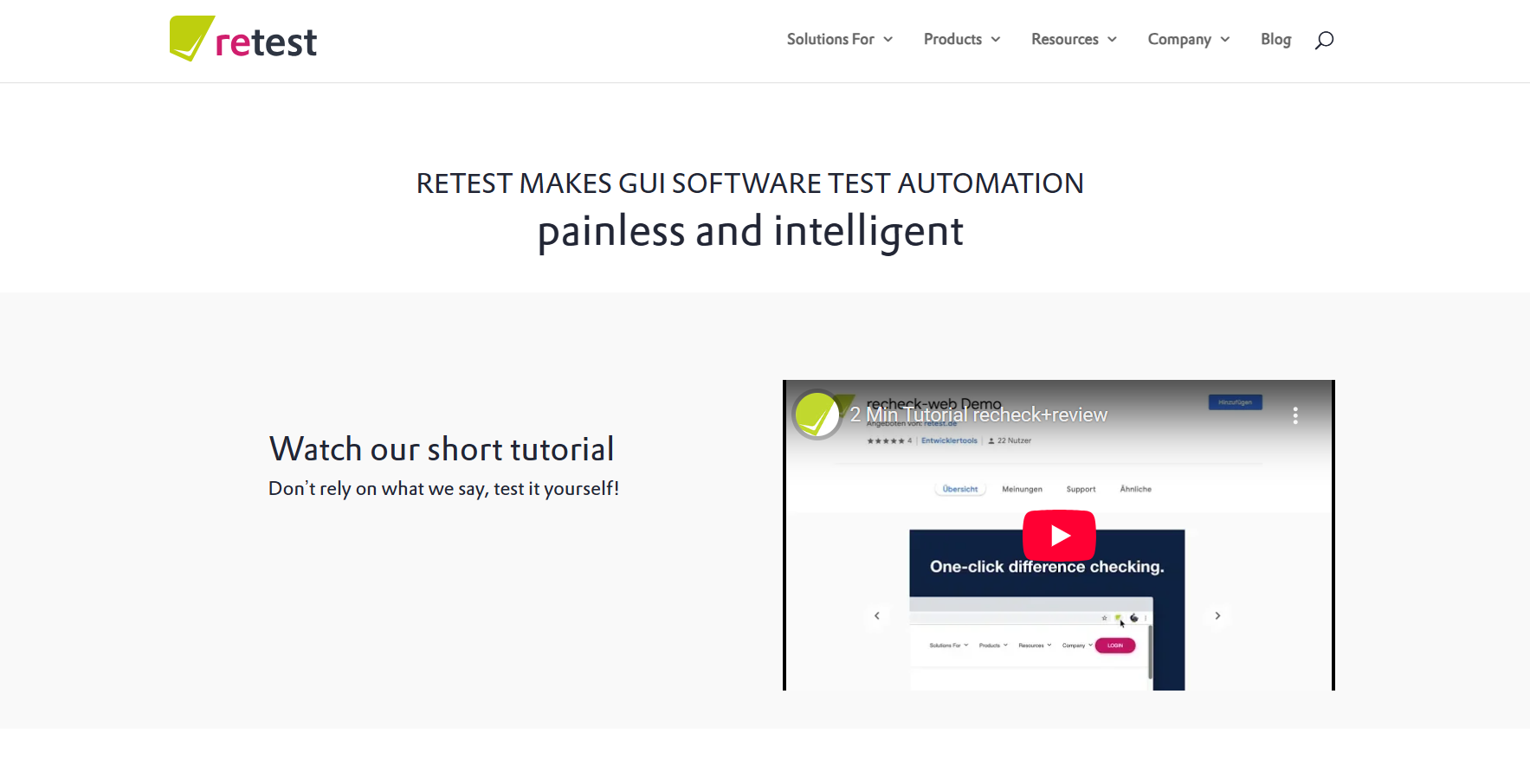
Key features:
- Input Generation: Combines random input with difference testing to find unexpected GUI behaviors.
- Golden Master Testing: Detects functional and visual changes between software versions.
- Test Optimization: Uses genetic algorithms to maximize code coverage.
- Action Prioritization: Employs neural networks to prioritize GUI actions, mimicking human behavior.
- Test Automation: Automatically generates robust, maintainable tests.
- Components: Includes recheck for automation and review for managing test differences.
 Note
NoteRun tests across 5000+ real devices, browsers and OS combinations. Try LambdaTest now!
6. PITest
PITest is a world-class mutation testing system that offers comprehensive test coverage for Java with the help of AI-powered heuristics. This highly integrable and scalable open-source AI testing tool meets the needs of real-world development teams instead of just catering to mostly academic research.
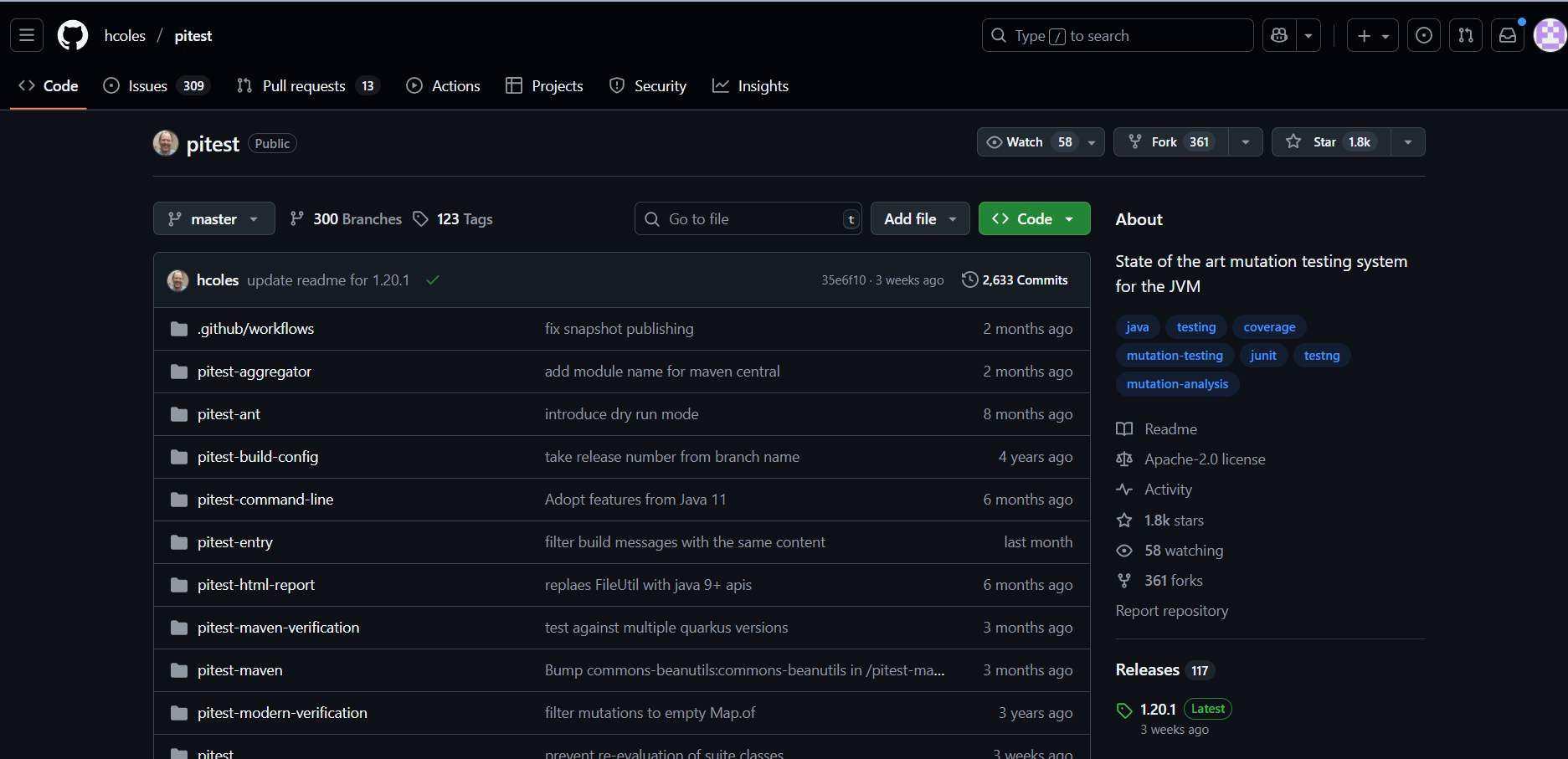
Key features:
- Mutation Testing: Introduces code mutations to identify test suite weaknesses.
- Detailed Reports: Provides clear reports combining mutation and line coverage.
- Build Tool Integration: Easy to use with Maven and Gradle.
- Extensibility: Supports extensions and plugins for additional languages and customization.
7. EvoMaster
EvoMaster is an open-source AI testing tool that generates system-level test cases automatically for enterprise and web applications. It fuzzes RPC, GraphQL, and REST APIs to enhance test coverage by uncovering vulnerabilities while improving the reliability of software by automating test case generation and API fuzzing. At the same time, it greatly reduces the effort required for manual testing.
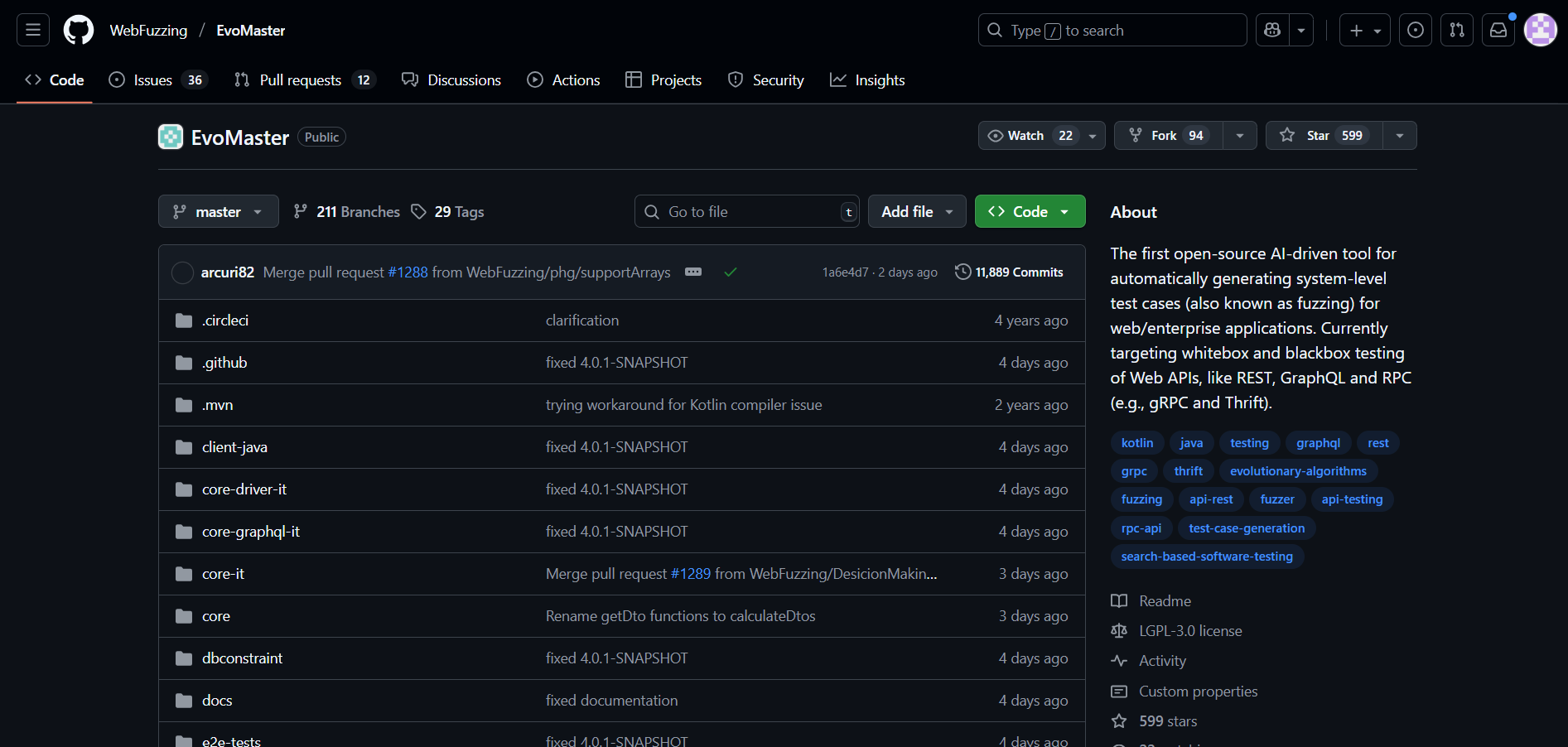
Key features:
- SQL Support: Handles authentication and SQL for database analysis.
- API Security Testing: Facilitates testing using authentication mechanisms.
- CI/CD Integration: Available as GitHub Action and Docker container.
- Multi-language Output: Generates test cases in JavaScript, Kotlin, JUnit, and Python.
- Testing Techniques: Uses bytecode analysis for white-box and black-box testing of JVM-based APIs.
8. Schemathesis
Schemathesis is one of the leading open-source AI testing tools for GraphQL and REST APIs. It leverages blueprints in the form of API specs to generate test cases while it tests for general properties like responses that stick to the API spec.
That’s how a test suite is able to broaden the capabilities of a testing suite to detect vulnerabilities and other issues. Companies such as Netflix (Dispatch), WordPress (OpenVerse), Spotify (Backstage), and Qdrant use it for their open-source projects.
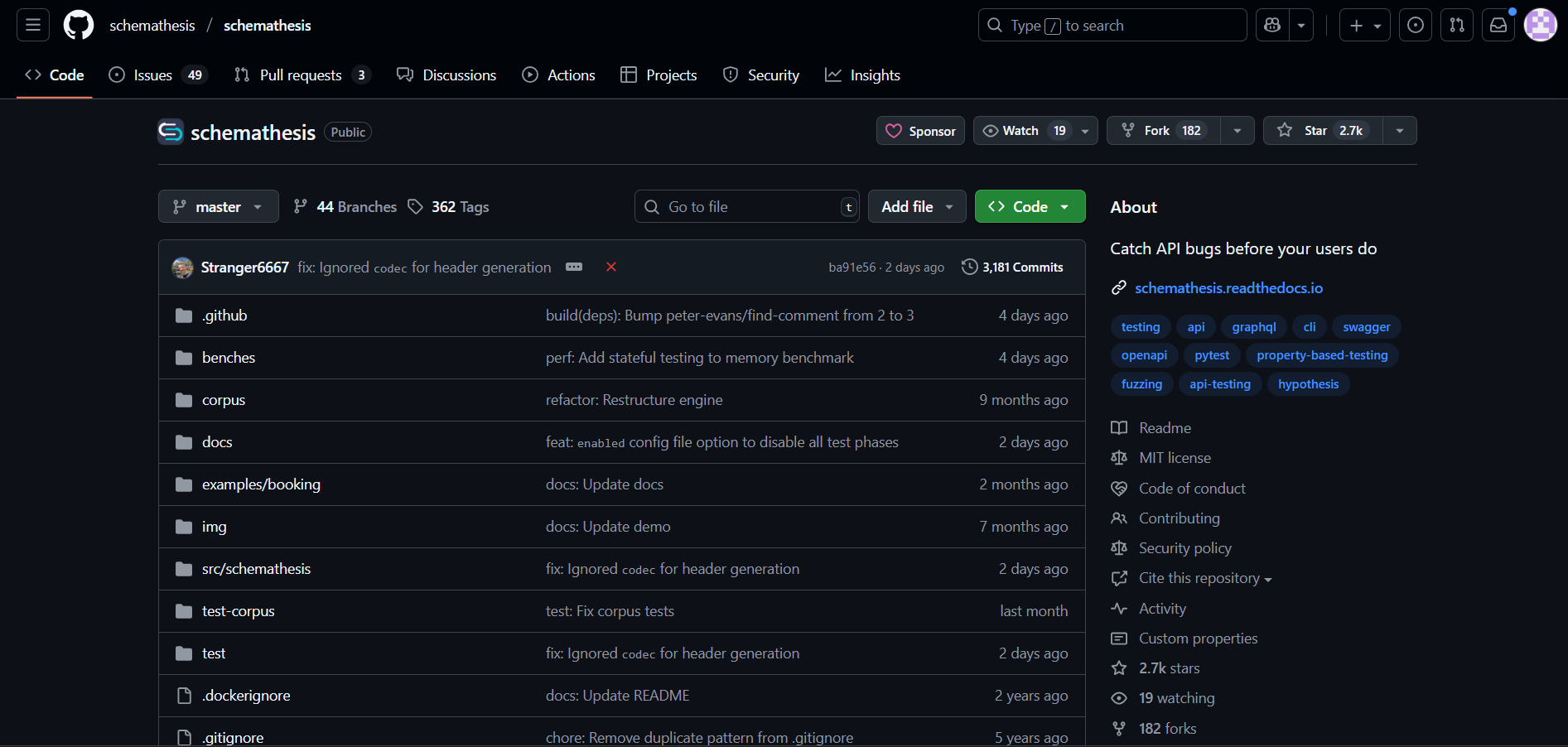
Key features:
- Extensions & Customization: Provides Python extensions and configuration options.
- Debugging Support: Uses cURL commands for failing test cases.
- CI/CD Compatibility: Integrates with existing workflows, OpenAPI, and GraphQL.
- Test Case Generation: Automatically generates tests based on the API schema.
9. DeepAPI
Created by OpenAI, DeepAPI is an open-source AI testing tool with two versions—Theano and PyTorch. The former contains code to run tests, whereas the latter is a repository with added features. Developers can use it to improve API reliability, performance, and security with anomaly detection, indicating problems such as security loopholes, unprecedented behavior, and incorrect responses.
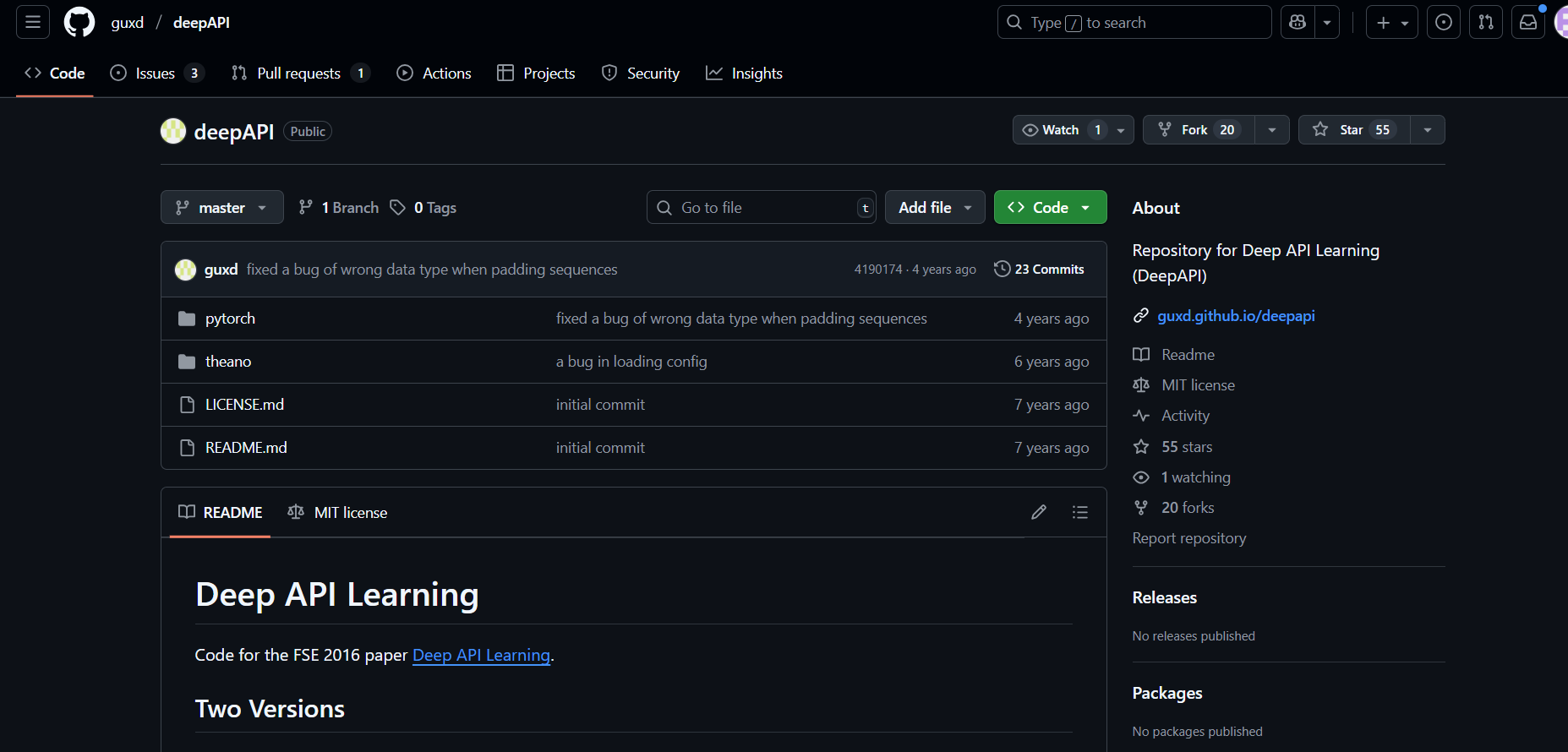
Key features:
- Anomaly Detection: Uses ML algorithms to monitor API performance in real-time.
- API Support: Covers REST and GraphQL API products.
- Visualization: Provides a clear anomaly presentation for easier response.
- Customizable Strategies: Allows tailoring of test generation and algorithms to user needs.
10. RPA Framework
RPA framework refers to a collection of open-source tools and libraries that cater to robotic process automation. You can use it with both Python and Robot Framework to offer well-maintained and documented core libraries to assist developers.
Sponsored by Robocorp, the RPA framework is completely open-source and optimized for developer tools and the control room. It detects performance problems, regressions, and inconsistencies with AI-powered techniques, facilitating hassle-free optimization and updates of different test automation processes.
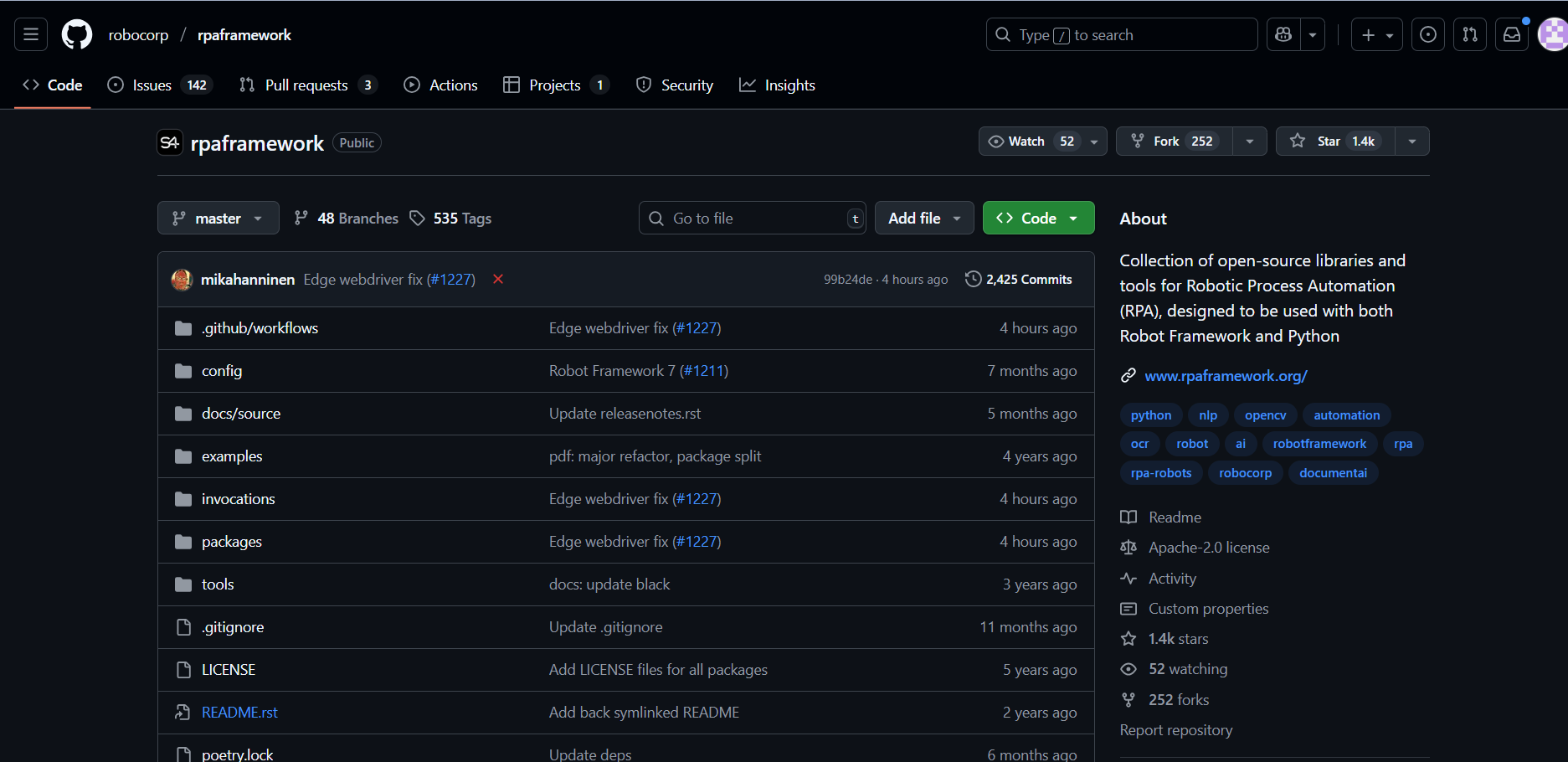
Key features:
- CI/CD Integration: Connects with DevOps pipelines for continuous testing.
- AI Analytics: Detects issues by comparing expected and actual results using data validation.
- Anomaly Recognition: Identifies unexpected behavior during test execution.
- Regression Testing: Detects unforeseen changes and failures after updates.
11. Botium Core
Botium Core is an open-source AI testing tool designed specifically for testing conversational AI systems, such as chatbots and virtual assistants. Often referred to as “The Selenium for Chatbots,” it provides a framework for automating and validating chatbot interactions, ensuring they perform as expected across various conversational platforms.
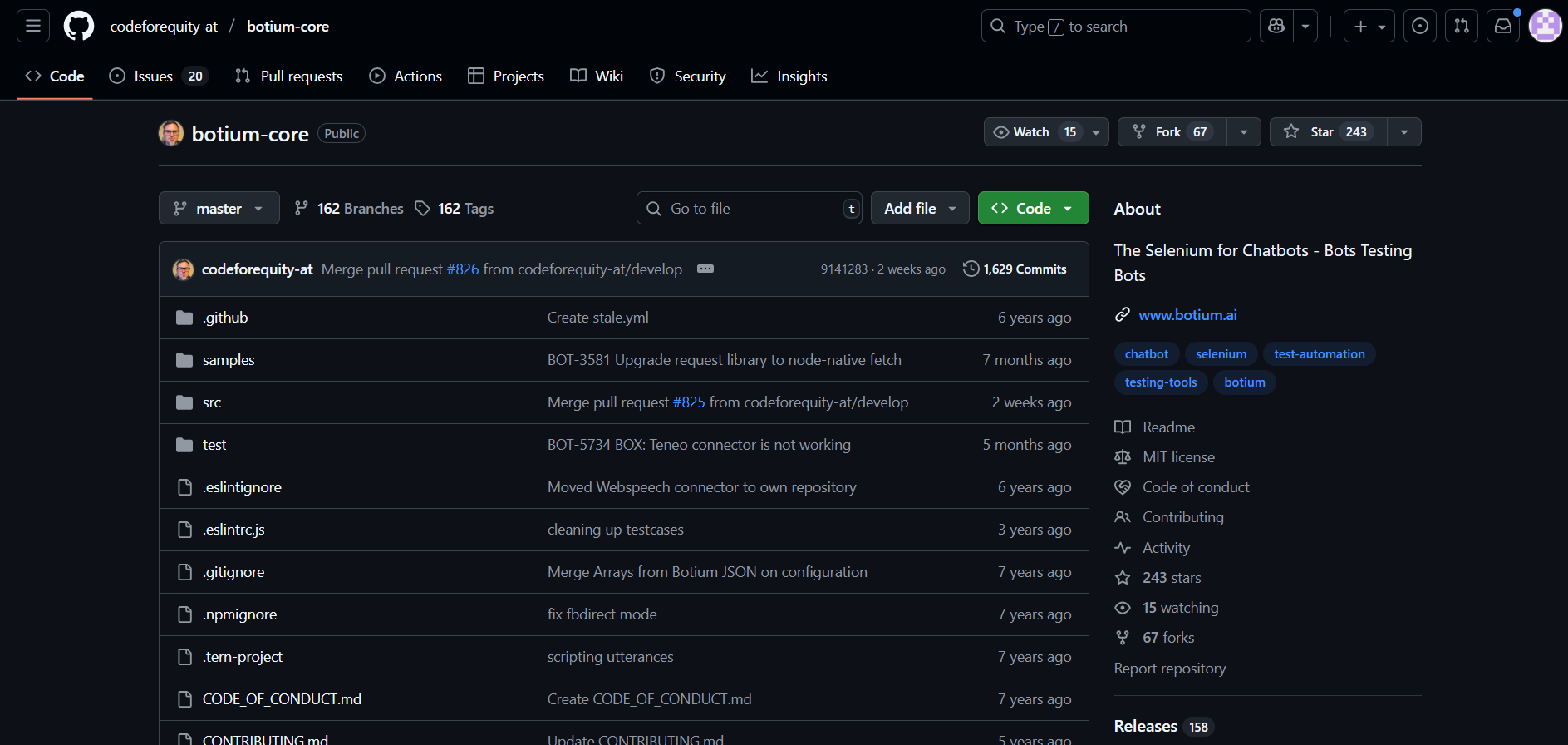
Key features:
- Domain-Specific Language: Defines chatbot test cases specifying conversational flows.
- Flexible Formats: Supports plain text, Excel, CSV, JSON, and YAML for test definitions.
- Broad Compatibility: Works with over 55 conversational AI and NLP platforms.
- CI/CD Integration: Enables automated testing within development pipelines.
- CLI Tool: Provides a command-line interface for test execution and management.
12. SikuliX
SikuliX is one of the most powerful open-source AI testing tools for UI automation. It started in 2009 at the UI Design group at MIT as an open-source research project. As long as you have a 64-bit Java installation, version 8 or higher, you can download SikuliX and leverage the power of its image recognition for interacting with GUIs.
It detects and manipulates various on-screen elements based on different visual patterns to enable automation. It’s ideal for testing applications that don’t necessarily have a traditional automation interface, such as DOM access or API.
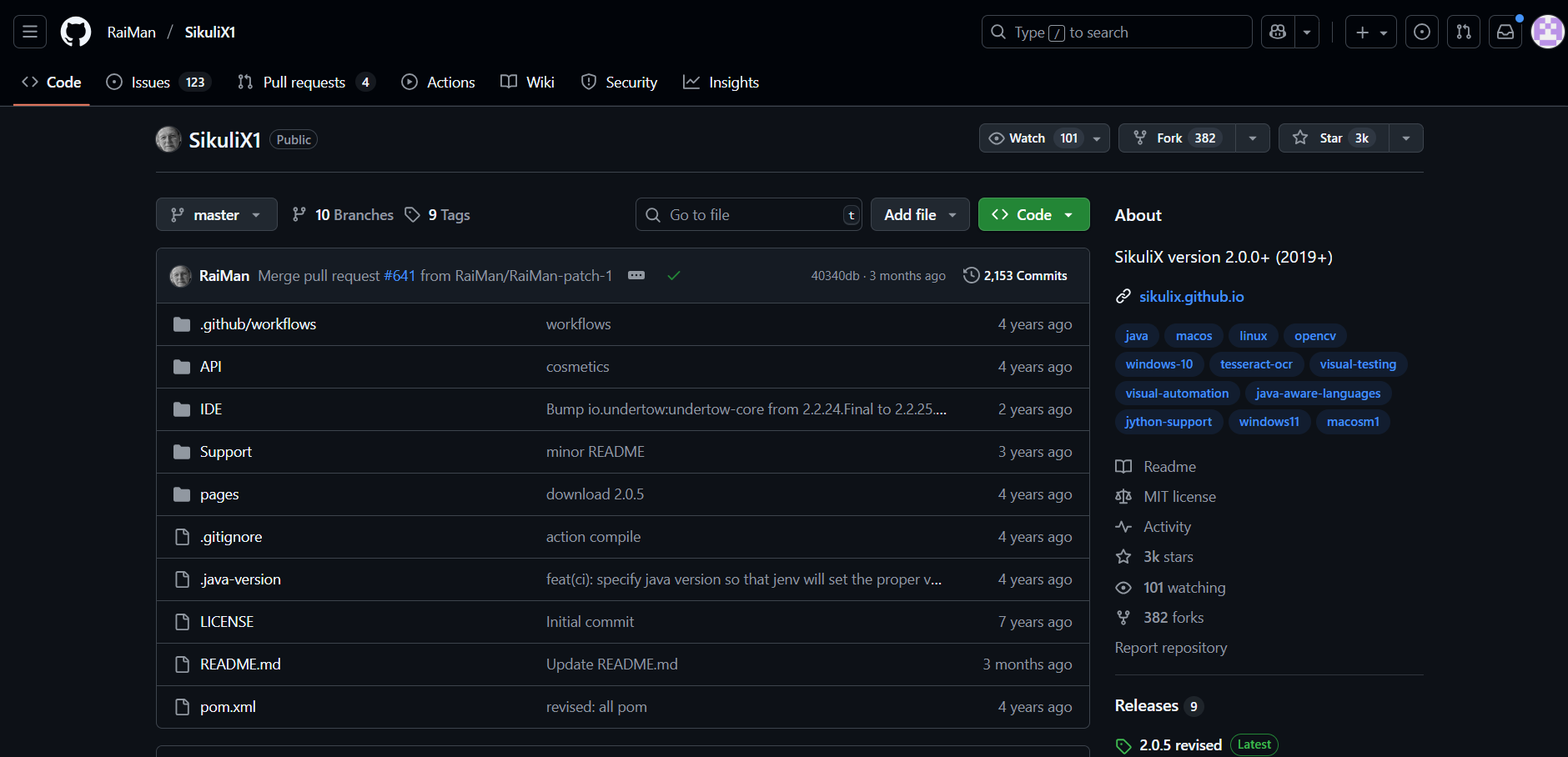
Key features:
- Tool Integration: Easily integrates with RPA framework, RPM, and Selenium.
- OCR-Based Recognition: Enables dynamic reading and interaction with text.
- Script Automation: Supports Java and Python scripting.
- Cross-Platform Support: Compatible with Linux, Windows, and Mac OS.
13. Atheris
Atheris is a coverage-guided fuzzing engine for Python applications. This open-source AI-enhanced testing tool offers support for native extensions for CPython, along with facilitating Python code fuzzing. You can use it combined with Undefined Behavior Sanitizer or Address Sanitizer if you want to catch some extra bugs.
The tool will try different inputs to a program repeatedly while keeping a close eye on its execution, trying to uncover interesting paths. One of the best Atheris uses, if you already have a way to express correct or incorrect behaviors, is that you can also use it on pure Python code.
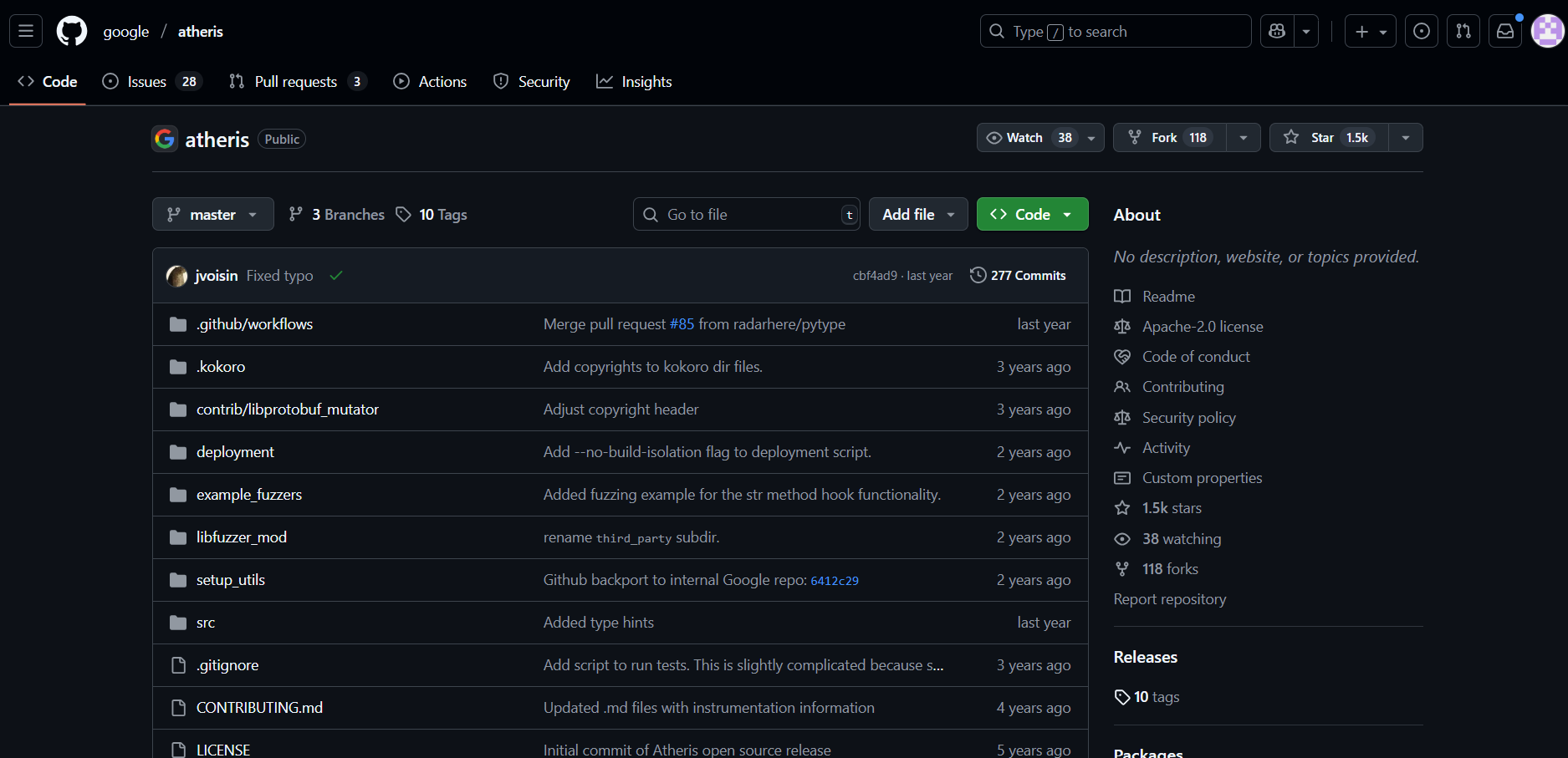
Key features:
- AI-Enhanced Fuzzing: Explores code paths using intelligent mutation strategies.
- Coverage-Guided Testing: Dynamically adjusts test inputs based on execution paths.
- Language Support: Works with C/C++ extensions and pure Python.
- Google Backed: Developed and maintained by Google for robustness.
14. DeepExploit
DeepExploit is a fully automated open-source AI testing tool that uses reinforcement learning to identify every single open port status on the target server and facilitates execution of the exploit at a pinpoint.
As more and more penetration testers make use of this tool, DeepExploit continues to learn exploitation with the help of deep reinforcement learning and improves the accuracy of tests. It adjusts the attack strategy dynamically on the basis of scan results, which leads to the tool becoming highly effective and adaptive for any type of security assessment.
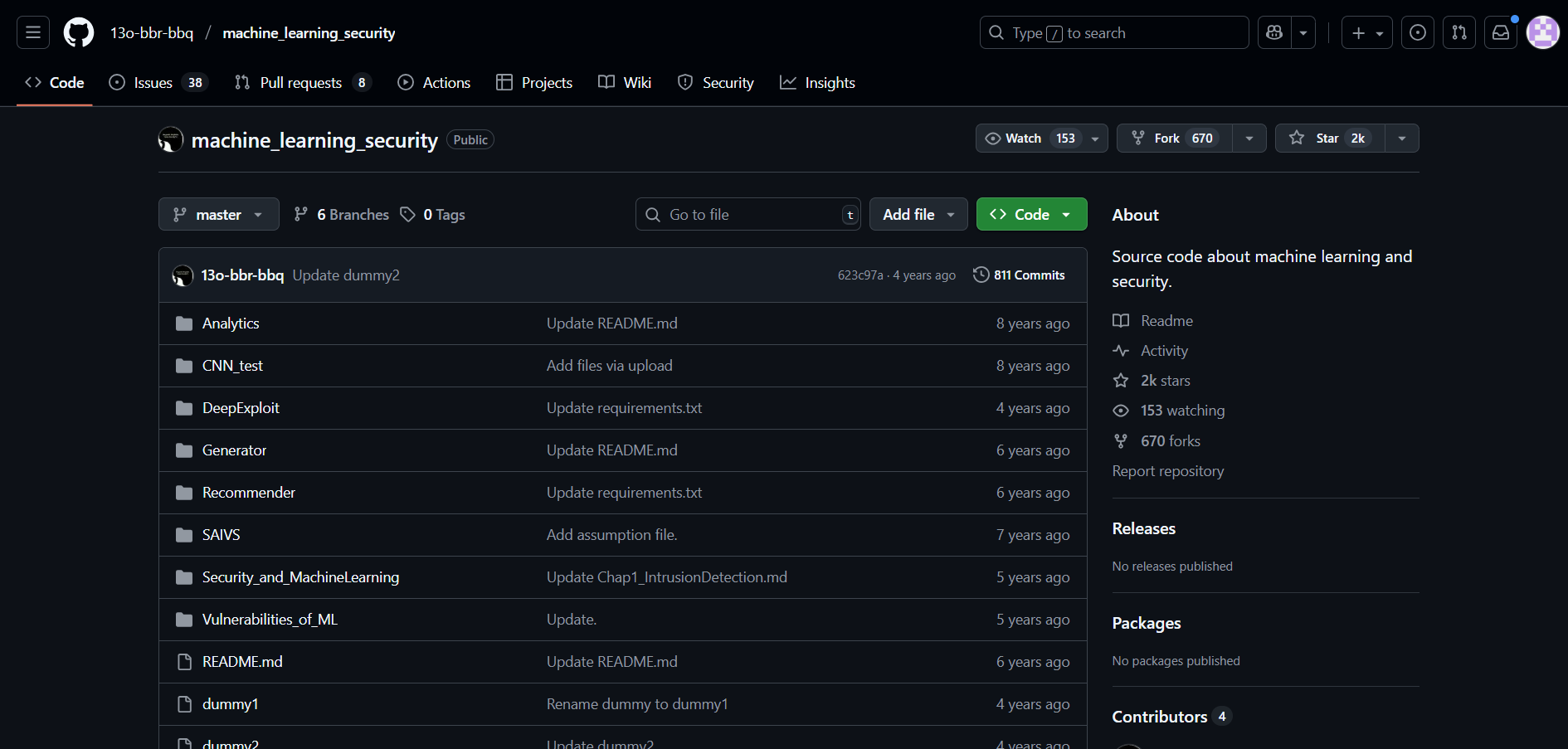
Key features:
- Self-Learning Engine: Continuously improves exploitation strategies over time.
- Metasploit Integration: Enhances exploit capabilities with the Metasploit framework.
- Automation: Fully automates exploitation, vulnerability scanning, and outcome analysis.
- AI-Powered Decisions: Uses deep reinforcement learning to select and launch optimal exploits.
15. DeepPerf
DeepPerf is an open-source AI testing tool designed for performance testing and bottleneck analysis. It leverages deep learning techniques to predict system performance under different configurations, reducing the need for exhaustive testing. By analyzing performance-related data from various configurations, DeepPerf helps make informed decisions on optimal configurations, ultimately lowering testing costs.
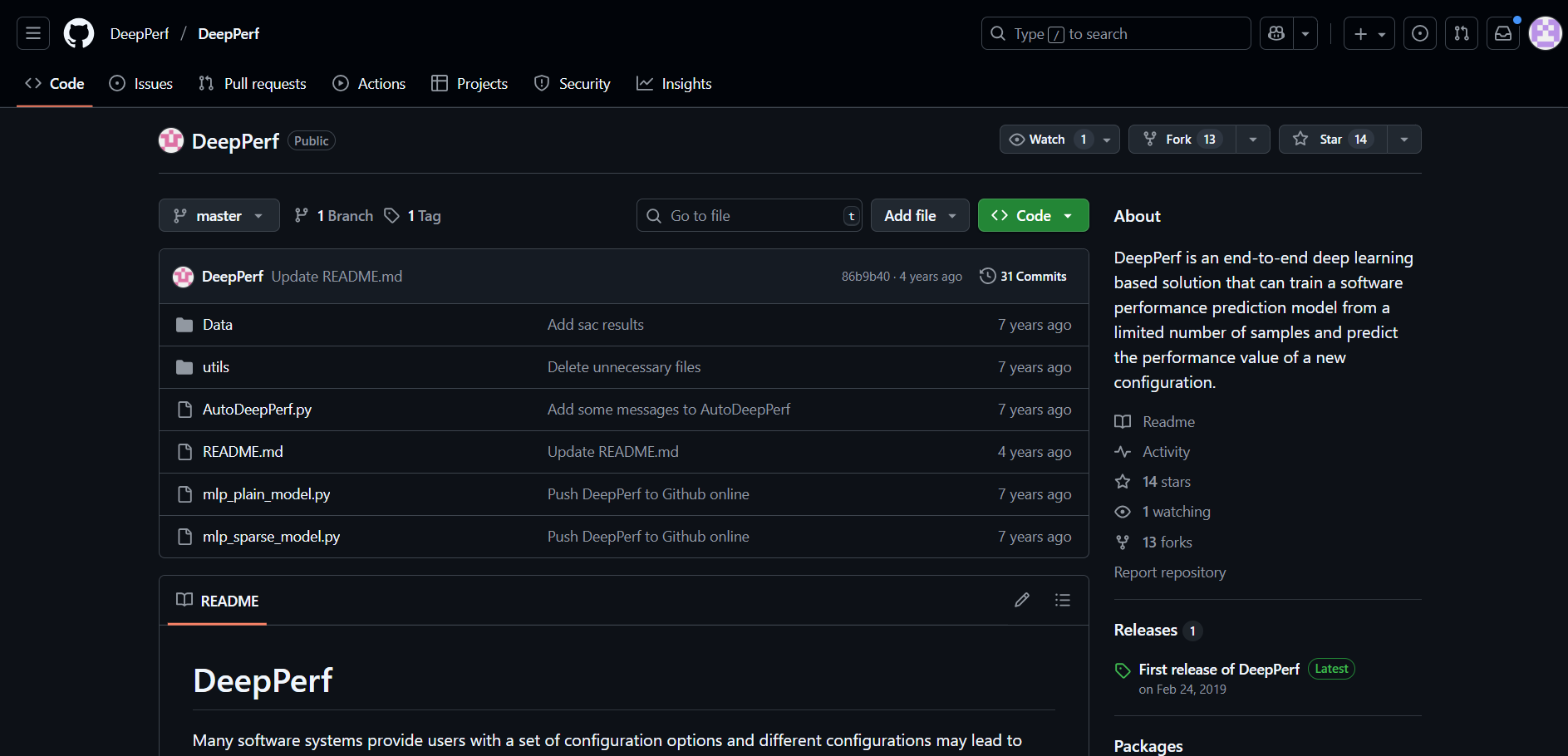
Key features:
- Performance Prediction: Uses deep learning to forecast performance under various configurations.
- Parameter Optimization: Enhances accuracy by tuning neural network parameters early.
- Pre-Deployment Evaluation: Assesses system performance based on configuration changes.
- Sample Efficiency: Predicts behavior with minimal samples, reducing exhaustive testing and costs.
The tools mentioned above are complete open-source AI testing tools. Now, let’s look at some tools that are commercial tools This means that while some features are free to use and adaptable, others require a paid upgrade or additional licenses for access to advanced functionalities.
Commercial AI Testing Tools
Commercial testing tools often provide a free core product with optional premium, AI-driven add-ons. These additions enhance the testing process with AI capabilities but do not make the tools fully AI-native.
Fully commercial AI testing tools, by contrast, are proprietary solutions built with AI at their core. They are truly AI-powered, AI-featured, or AI-native, offering end-to-end automation, enterprise-grade support, and comprehensive lifecycle coverage.
1. LambdaTest KaneAI
LambdaTest KaneAI is a GenAI-native testing agent that empowers teams to plan, create, and refine test cases using natural language. This makes test authoring intuitive and efficient, eliminating the need for complex scripting and improving collaboration between technical and non-technical stakeholders.
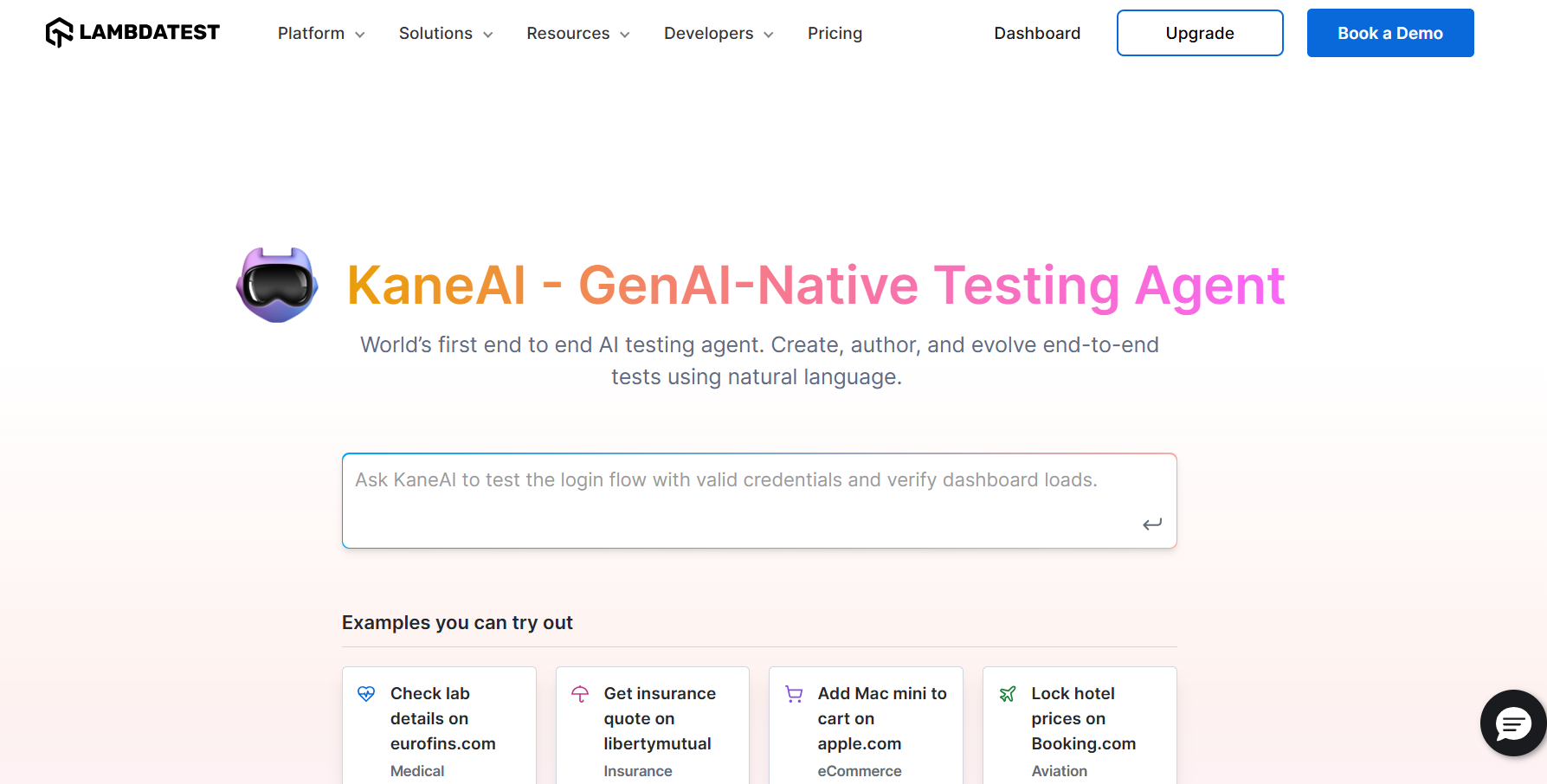
Key features:
- Plain English Test Generation: Creates automated test cases from scenario descriptions.
- Automatic Translation: Converts high-level objectives into executable steps.
- Natural Language Validation: Validates test conditions for faster logic creation.
- Smart Versioning: Maintains separate versions for test changes.
- Integration Tags: Uses KaneAI tags in Slack, JIRA, GitHub, and Google Sheets to create test cases.
- Flexible Configuration: Supports simplified, data-driven testing.
2. Diffy
Diffy is an AI-driven visual regression testing tool focused on WordPress and Drupal sites. While it offers some automation features for developers, it is not a fully open-source AI testing tool. Instead, it operates as a commercial solution with AI-powered functionalities to ensure visual consistency during code changes.
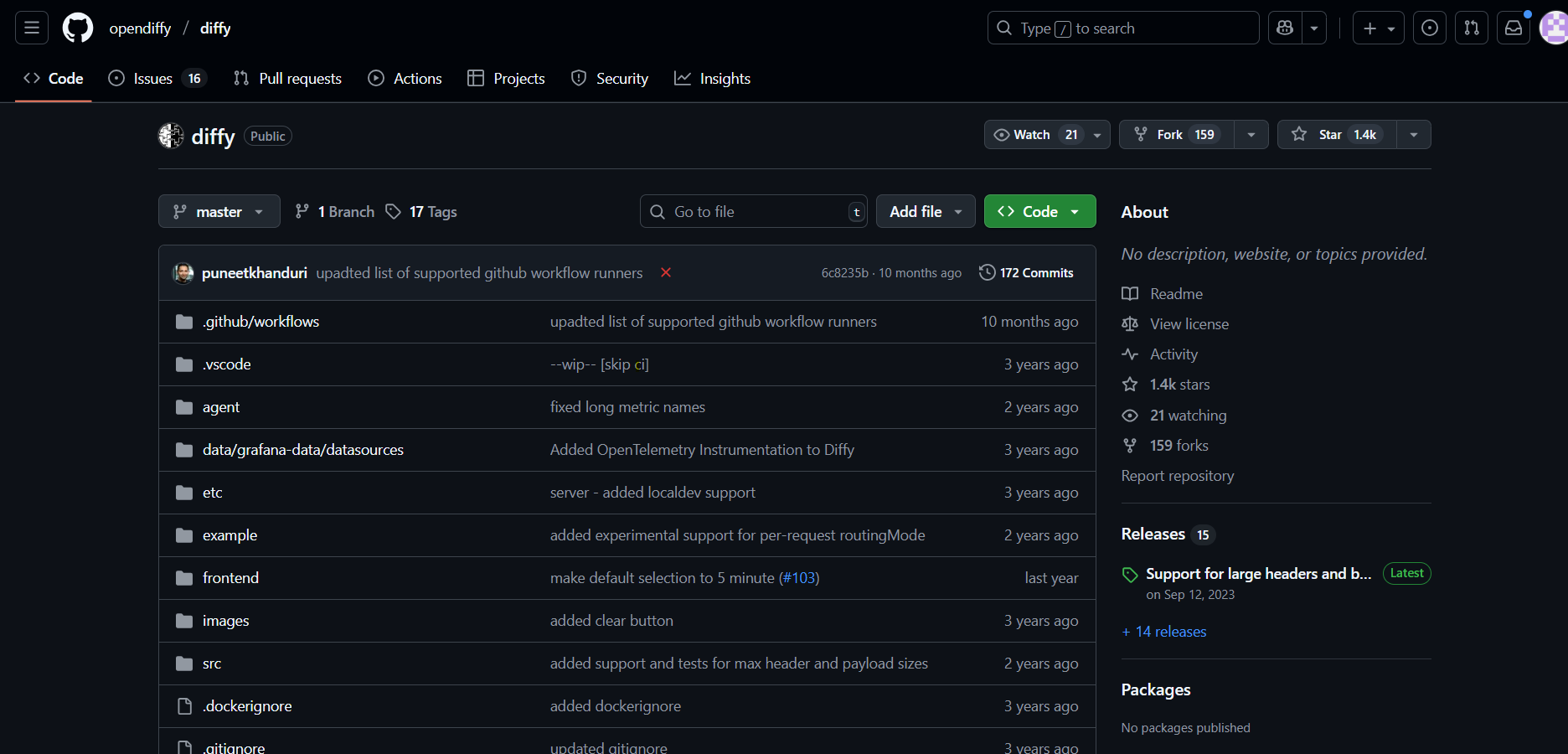
Key features:
- Visual Regression: Detects changes between before-and-after screenshots.
- AI Filtering: Reduces false positives by ignoring dynamic content differences.
- Maintenance Support: Alerts teams to unintended visual shifts.
- Developer Assistance: Automatically generates config suggestions and Loom recordings for UI validation.
3. Katalon Studio
Katalon Studio is a commercial AI-powered test automation platform designed for API, mobile, desktop, and web applications. While widely used for intelligent automation, it is not a fully open-source AI testing tool. It leverages machine learning and AI to streamline test creation, execution, and maintenance, making it suitable for both beginners and advanced testers.
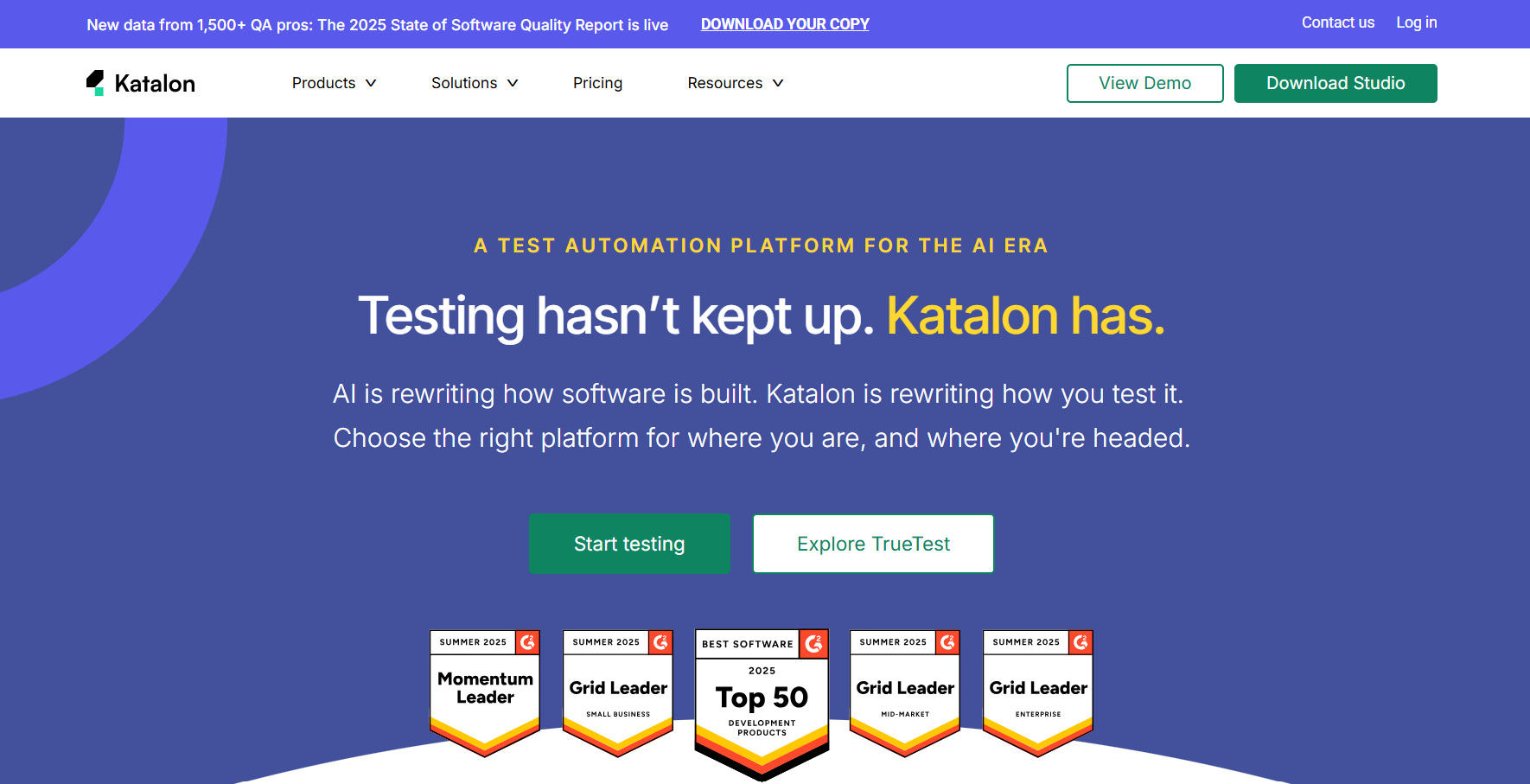
Key Features:
- Code Generation: Creates studio keywords and Groovy code from prompts.
- Manual Test Generation: Supports single-click test creation from case descriptions.
- Failure Analysis: Categorizes failed tests by root cause with recommended actions.
- Self-Healing: Finds alternatives when broken locators are detected.
- Image Locator: Locates UI elements based on rendering, not attributes.
- Smart Wait: Waits for front-end processes to finish before the next test steps.
4. Diffblue Cover
Diffblue Cover is a commercial AI-powered testing tool designed to automate unit testing for Java applications. Built on reinforcement learning, it generates accurate and maintainable test code without requiring manual effort. While it delivers impressive performance, it is not a fully open-source AI testing tool.
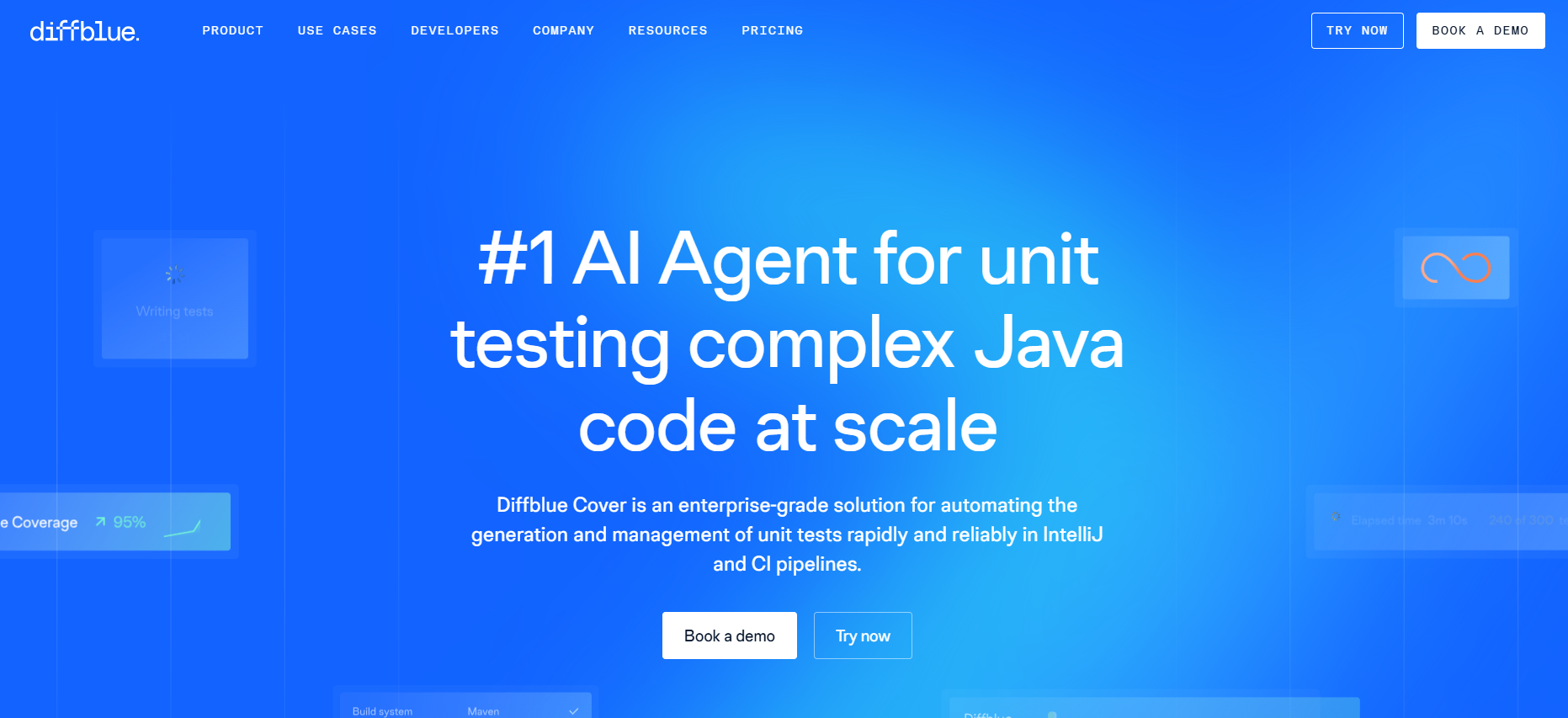
Key features:
- Reinforcement Learning: Creates efficient, maintainable, and accurate unit tests.
- CI Integration: Enables scalable, automated unit testing in CI pipelines.
- JUnit Compatibility: Supports JUnit 4 and 5 for easy Java project adoption.
- Refactoring Awareness: Keeps tests synced with evolving code changes.
How To Choose the Right Open-Source AI Testing Tool?
Selecting the appropriate open-source AI testing tool is one of the most critical decisions an organization can make. It significantly influences the effectiveness, efficiency, and quality of the testing process.
Each tool serves specific requirements, so the choice must align with unique project needs, long-term goals, and team expertise.
- Define unique testing objectives: Outline goals for functional, performance, data validation, and AI model testing.
- Evaluate tool compatibility: Ensure integration with your tech stack, CI/CD pipelines, frameworks, languages, OS, and cloud environments.
- Assess tool features: Identify critical capabilities like AI automation, self-healing, data processing, customizability, dashboards, scalability, and insights.
- Consider learning curve and expertise: Check if the tool is beginner-friendly, team skills, training needs, and available documentation and community support.
- Evaluate maintenance and community support: Look for active development, updates, large communities, forums, and support hubs.
- Consider resource and budget constraints: Balance tool value with costs related to cloud, hardware, customization, and training.
- Use a pilot project: Run a trial to test performance and compatibility, gather feedback, and resolve issues before full deployment.
- Seek case studies and peer recommendations: Review case studies and feedback from similar organizations to validate your choice.
Conclusion
As AI continues to revolutionize various industries, ensuring the robustness, fairness, and reliability of AI systems has never been more crucial. Leveraging the right open-source AI testing tool enables organizations and developers to effectively evaluate, debug, and enhance AI models.
By selecting the most compatible tool, you can improve the quality and performance of your AI systems while contributing to a collaborative, transparent, and innovative ecosystem that drives the future of AI. These tools empower teams to tackle the challenges in AI development, fostering accountability and continual growth within the open-source community.
Frequently Asked Questions (FAQs)
What are open-source AI testing tools?
Open-source AI testing tools refer to freely available frameworks & libraries to evaluate, debug, and enhance AI models. They ensure fairness, reliability, and robustness in various AI systems.
How can I know which tool is suitable for my organization?
As long as the tool you’re looking for has high credibility, success stories, and trust factors and checks all the boxes for your unique organization or project requirements, it’s worth narrowing down.
How do open-source AI testing tools handle bias detection?
They analyze AI models against diverse datasets to identify unfair patterns. Many include metrics and reports to highlight bias sources for corrective action. This helps improve AI fairness over time.
Can these tools integrate with existing test automation frameworks?
Yes, most open-source AI testing tools support integration with popular frameworks like Selenium, Appium, or JUnit. This enables smoother workflows without disrupting current automation setups.
Are open-source AI testing tools suitable for large-scale projects?
Absolutely. Their flexibility and scalability allow them to handle complex projects, multiple environments, and diverse testing needs effectively, often matching commercial tool capabilities.
What kind of community support is available for these tools?
Active communities exist around many open-source AI tools, providing forums, GitHub repositories, documentation, and peer support. This collaborative environment accelerates problem-solving and feature development.
How frequently are these tools updated and maintained?
Update frequency varies, but many tools receive regular patches and feature enhancements driven by community contributions and evolving AI testing needs.
Do open-source AI testing tools require extensive coding knowledge?
While some tools offer user-friendly interfaces, a basic understanding of programming improves customization and advanced usage. Many provide tutorials and templates to ease onboarding.
How secure are open-source AI testing tools?
Security depends on the tool and its community practices. Regular updates, transparency, and open code reviews help quickly identify and fix vulnerabilities, making them generally secure.
Can these tools assist with compliance requirements?
Yes, they help validate AI models against standards for fairness, transparency, and reliability. This support aids organizations in meeting regulatory and ethical guidelines effectively.
Author

